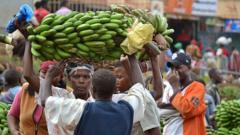As Tanzania seeks to protect its economic interests, the ban on imports from South Africa and Malawi raises concerns about regional trade relations and supply chains.
**Tanzania Implements Import Ban on Agricultural Goods from South Africa and Malawi Amid Trade Tensions**

**Tanzania Implements Import Ban on Agricultural Goods from South Africa and Malawi Amid Trade Tensions**
Tanzania's recent decision to ban imports from its neighbors intensifies ongoing trade disputes over agricultural products.
In the latest development amidst escalating trade tensions, Tanzania has implemented a ban on all agricultural imports from South Africa and Malawi. Agriculture Minister Hussein Bashe announced the decision on Wednesday, emphasizing the need to protect domestic business interests. "We are taking this step to protect our business interests. This is business," Bashe stated, as he confirmed the halt of imports in response to ongoing disputes in trade.
For years, South Africa has faced backlash for prohibiting the entry of Tanzanian bananas, while Malawi has instated restrictions on various Tanzanian agricultural products, including flour, rice, ginger, and maize. Despite diplomatic efforts to navigate these concerns, Bashe noted that negotiations were still ongoing but had yet to yield results.
The ban poses significant implications for both South Africa and Malawi, particularly as South African exports, including fruits like apples and grapes, now face obstacles. Conversely, landlocked Malawi relies heavily on Tanzanian ports to facilitate its tobacco, sugar, and soybean exports, which may necessitate rerouting and increasing transportation costs.
Malawi’s previous import restrictions sought to temporarily safeguard local producers against foreign competition. Trade Minister Vitumbiko Mumba described these measures as "a strategic move," while Bashe criticized them for being "unfair and harmful" to Tanzanian traders. In his remarks, he reassured the public that the latest ban would not compromise food security, quipping, "No Tanzanian will die from a lack of South African grapes or apples."
Trade relations among the three nations—members of the Southern African Development Community (SADC)—are evidently strained as this dispute unfolds. A recent social media post by Bashe showcased rotten bananas stranded at the border with Malawi, highlighting the immediate repercussions of the trade disruptions.
While Tanzanian exports to Malawi have reportedly tripled from 2018 to 2023, the ban invites questions over how Malawi will manage its exports without access to the vital port of Dar es Salaam. The alternative routes through Mozambican ports like Beira and Nacala may prove more expensive and cumbersome.
In concluding his comments, Bashe insisted that his administration is not seeking a trade war but rather striving for fairness in market access. "Tanzania will not continue to allow unequal market access to persist at the expense of its people," he asserted, as trade dynamics continue to shift in response to these developments.
For years, South Africa has faced backlash for prohibiting the entry of Tanzanian bananas, while Malawi has instated restrictions on various Tanzanian agricultural products, including flour, rice, ginger, and maize. Despite diplomatic efforts to navigate these concerns, Bashe noted that negotiations were still ongoing but had yet to yield results.
The ban poses significant implications for both South Africa and Malawi, particularly as South African exports, including fruits like apples and grapes, now face obstacles. Conversely, landlocked Malawi relies heavily on Tanzanian ports to facilitate its tobacco, sugar, and soybean exports, which may necessitate rerouting and increasing transportation costs.
Malawi’s previous import restrictions sought to temporarily safeguard local producers against foreign competition. Trade Minister Vitumbiko Mumba described these measures as "a strategic move," while Bashe criticized them for being "unfair and harmful" to Tanzanian traders. In his remarks, he reassured the public that the latest ban would not compromise food security, quipping, "No Tanzanian will die from a lack of South African grapes or apples."
Trade relations among the three nations—members of the Southern African Development Community (SADC)—are evidently strained as this dispute unfolds. A recent social media post by Bashe showcased rotten bananas stranded at the border with Malawi, highlighting the immediate repercussions of the trade disruptions.
While Tanzanian exports to Malawi have reportedly tripled from 2018 to 2023, the ban invites questions over how Malawi will manage its exports without access to the vital port of Dar es Salaam. The alternative routes through Mozambican ports like Beira and Nacala may prove more expensive and cumbersome.
In concluding his comments, Bashe insisted that his administration is not seeking a trade war but rather striving for fairness in market access. "Tanzania will not continue to allow unequal market access to persist at the expense of its people," he asserted, as trade dynamics continue to shift in response to these developments.

















